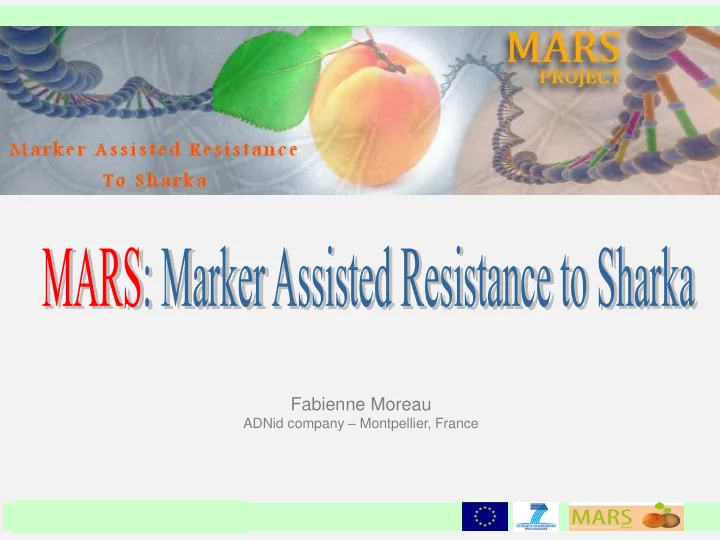

Fabienne Moreau ADNid company – Montpellier, France
Objective of MARS program Markers Assisted SMEs TRANSFERT Selection Technology To speed up the selection of new apricot cultivars resistant to Sharka
Objective of MARS program Biotechnology SMEs Genetic knowledge on apricot TRANSFERT Molecular tools as molecular markers Stone Fruit linked to the resistance Breeder SMEs to use the molecular data for the selection of varieties resistant to Sharka
Objectives of MARS program 1. The implementation of the MAS for Sharka resistance in Apricot all over Europe 2. The finalization of the agronomical evaluation of PPV resistant breeding material by the stone fruit breeders.
Workflow of the organisation and the role of partners Shipment of leaf samples to biotech SMEs Poland Germany Czech R Slovakia Partner P13: Partner P17: Partner P10 *: France Romania BETA, Turkey FAL, Greece ADNid, France Serbia Bulgaria Italy Spain * 50 first sample plates Turkey Data transfer to MARS partners 1. DNA extraction in plates of 96 samples (breeders) and to the genotyping 2. DNA quality verification database (partner P02) 3. PCR amplification of the markers in multiplex 4. PCR fragment verification on agarose gels Shipment of PCR products to partner P10 5. PCR fragment verification and validation 6. Quality checking Partner P10: 7. Capillary electrophoresis of the PCR products 8. Quality checking of genotyping data ADNid, France 9. Genotype scoring on Genemapper 10. Preparation of datafile for MARS partners and for the genotyping database
Different stages for implementation of MAS • Stage 1 : Screening of the material with a first set of markers developed by Sharco program – Three markers associated to PPVres locus • • Stage 2 : Analysis of the resistant samples with a second set of markers – Four markers targeted also genetic factors closely linked to the resistance
Information about the different markers Chromosome 1 SSRLG1-11m52 AMMPG016 PGS1-10 PGS1-24 AMMPG021 PGS1-21 ZP002 PPVres locus Set 1 : PGS1-21/ZP002/PGS1-24 Set 2 : PGS1-10/AMMPG016 AMMPG021/SSRLG1-11m52
Stage 1 : screening of material Sources of resistance: Stark Early Orange or Goldrich but also Harlayne, Stella Continental climate Plant adapted to Mediterranean basin various European Oceanic climate environments Screening of material
Stage 1 : Collect of samples Italy Romania France Bulgaria 43 370 Czech rep Turkey Spain Greece
Stage 1 : Interpretation of results with the set 1 • Presence of 3 resistant alleles : resistant genotype • Presence of 0 resistant allele : susceptible genotype
Conclusion of the stage 1 About half of the samples analysed with set 1 were resistant START OF THE STAGE 2 The resistant samples have been analysed with set 2 These samples have been transferred to the nurseries in charge of the agronomical evaluation, multiplication and characterization before registration
Stage 2 : Samples number Italy Romania France Bulgaria 24 096 Czech rep Turkey Spain Greece
Stage 2 : Molecular results with the set 2 Each marker = resistant alleles
Stage 2 : Results for set 2 By combining the molecular information obtained with 7 markers, we have a genotype, resistant or susceptible which were validated by a phenotypic information
CONCLUSION At the end of MARS program we are able to offer to the nurseries a method: 1- to screen sensitive apricot progenies in breeding programs 2- to reduce by half the time and the work to produce new varieties resistant to Sharka
Recommend
More recommend